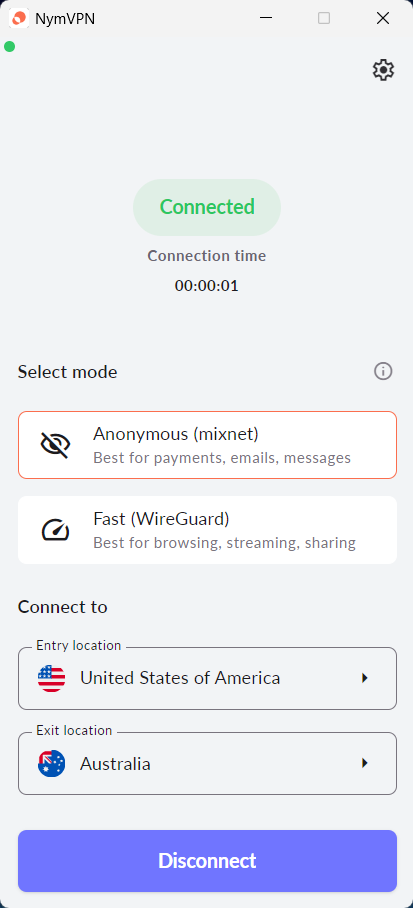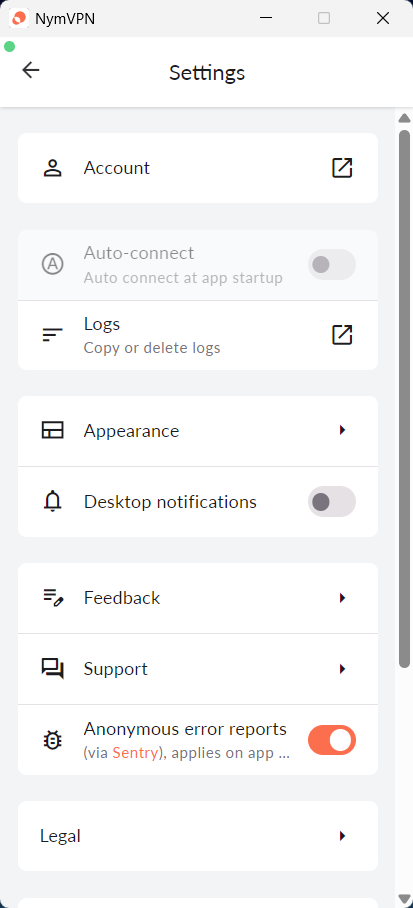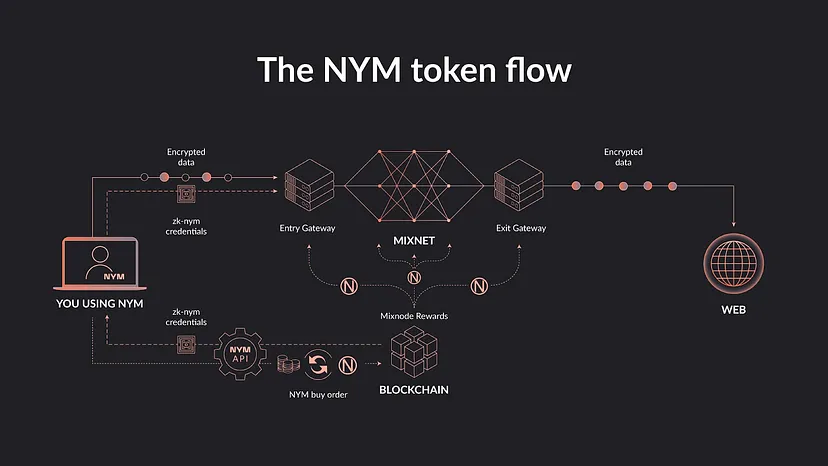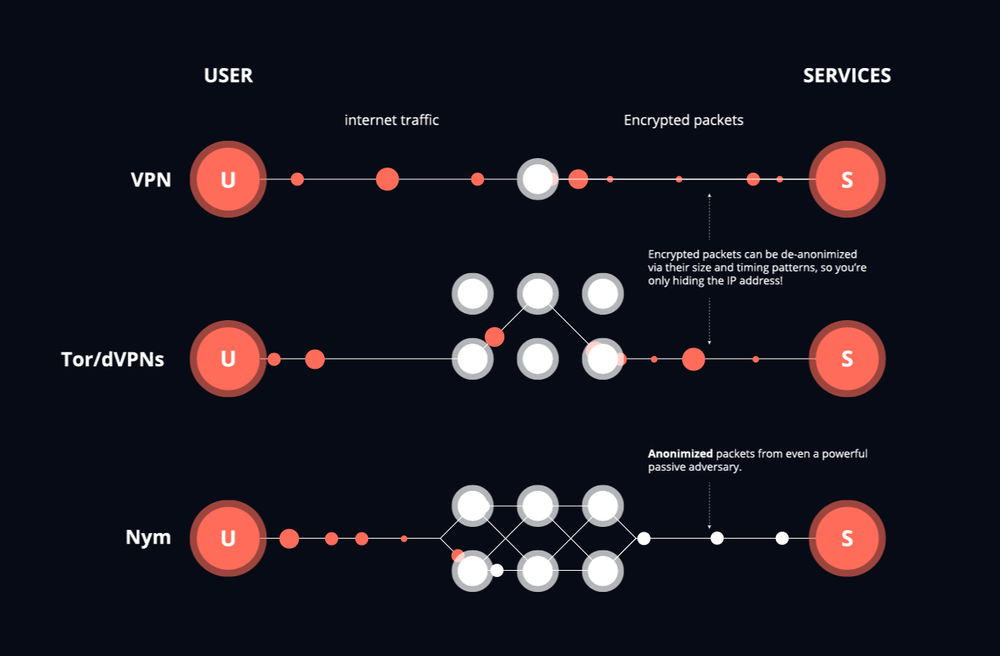NymVPN review: An innovative decentralized VPN with some work to do
At a glanceExpert's Rating Pros Unique decentralized Mixnet provides superior anonymity Open source Privacy-first approach Cons Still in beta Lacks some common VPN features Limited server network Future cryptocurrency payment model not accessible to everyone Our Verdict NymVPN is a really interesting, if somewhat incomplete, service built on decentralized blockchain technology. There are potentially huge privacy upsides with its Mixnet connections, but the beta version still has some bugs to work out and essential features to be added before I’d recommend it to anyone. Price When Reviewed This value will show the geolocated pricing text for product undefined Best Pricing Today NymVPN is a brand new service out to shake up the whole VPN market. It’s an ambitious project that uses blockchain technology to decentralize control of user privacy, taking it out of the hands of a central VPN provider and into those of individual users. Through the use of a decentralized Mixnet, traffic is routed through distributed nodes instead of just one encrypted tunnel in order to further obfuscate a user’s identity. NymVPN’s decentralized approach to privacy is set to make big waves in the VPN industry. That being said, it’s still in beta at the moment. This means there are kinks to work out and features yet to come. I took the pioneering service for a test drive to see what it’s all about and how its feature set, speeds, and privacy match up in the more traditional VPN market. NymVPN in brief: P2P allowed: Yes Simultaneous device connections: 10 Business location: Switzerland Number of servers: 700+ “mixnodes” Number of country locations: 34 Cost: Currently free during beta Further reading: See our roundup of the best VPN services to learn about competing products. What are NymVPN’s features & services? Sam Singleton Since NymVPN is still in beta, it hasn’t yet released its full set of features. At the moment the VPN Windows app offers little more than a server list, choice between a Mixnet or WireGuard connection, and a “Connect” button. Under the sparsely populated “Settings” menu there are a few cosmetic options and an area to provide feedback on the beta client. When discussing NymVPN’s feature set I can only really talk about what’s in store for the future full release. So, what will NymVPN have coming? Obligatory VPN features such as a kill switch and split tunneling are on the way, which will undoubtedly help the service compete against rivals. There are currently no plans for ad- and tracker-blocking, nor are there many other security extras on the horizon. NymVPN is also planning to offer some more unique privacy solutions in the near future. These include zero-knowledge proof access to allow you to access the network with total anonymity, as well as post-quantum cryptography and censorship-resistance features. NymVPN is pretty bare-bones right now with very little in the way of extra features or settings.Sam Singleton NymVPN’s sole focus seems to be its biggest selling point, the Mixnet. Unlike a traditional VPN which encrypts and routes your data through a single VPN server, NymVPN instead splits up your data, encrypts it, and then sends it through a multi-layered network. Your data is then mixed with the traffic of other users to anonymize it as it moves through the Mixnet before being rebuilt and decrypted at the endpoint. It’s a similar concept to how Tor anonymizes user traffic, but with the added benefit of built-in cover traffic and timing obfuscation so that even if someone were monitoring the entry and exit nodes they wouldn’t be able to discern one user’s traffic patterns from another. All of this will be run by volunteer node operators who, through Nym’s cryptocurrency system will be rewarded with Nym tokens for providing high-quality networking performance. Thus, the system is theoretically self-incentivizing—better operators means better anonymity for users means more rewards for the operators, and the cycle continues. Technical know-how aside, NymVPN has a few more things going for it. Not only does it allow privacy-first users to take advantage of the Mixnet for total anonymity, it also allows for more traditional two-hop WireGuard connections in case you need faster connections as well. The app itself is extremely easy to use. Switching entry and exit locations is dead simple and even toggling between “Anonymous (mixnet)” mode and “Fast (WireGuard)” mode is straightforward enough. NymVPN supports Windows, macOS, Android, and Linux platforms. NymVPN rewards its volunteer node operators with cryptocurrency tokens in a theoretically self-incentivizing system. How much does NymVPN cost? Currently, NymVPN is free during its beta access. All you have to do is sign up on NymVPN’s website, create an account, and download the app. After the offi

Expert's Rating
Pros
- Unique decentralized Mixnet provides superior anonymity
- Open source
- Privacy-first approach
Cons
- Still in beta
- Lacks some common VPN features
- Limited server network
- Future cryptocurrency payment model not accessible to everyone
Our Verdict
NymVPN is a really interesting, if somewhat incomplete, service built on decentralized blockchain technology. There are potentially huge privacy upsides with its Mixnet connections, but the beta version still has some bugs to work out and essential features to be added before I’d recommend it to anyone.
Price When Reviewed
This value will show the geolocated pricing text for product undefined
Best Pricing Today
NymVPN is a brand new service out to shake up the whole VPN market. It’s an ambitious project that uses blockchain technology to decentralize control of user privacy, taking it out of the hands of a central VPN provider and into those of individual users.
Through the use of a decentralized Mixnet, traffic is routed through distributed nodes instead of just one encrypted tunnel in order to further obfuscate a user’s identity.
NymVPN’s decentralized approach to privacy is set to make big waves in the VPN industry. That being said, it’s still in beta at the moment. This means there are kinks to work out and features yet to come. I took the pioneering service for a test drive to see what it’s all about and how its feature set, speeds, and privacy match up in the more traditional VPN market.
NymVPN in brief:
- P2P allowed: Yes
- Simultaneous device connections: 10
- Business location: Switzerland
- Number of servers: 700+ “mixnodes”
- Number of country locations: 34
- Cost: Currently free during beta
Further reading: See our roundup of the best VPN services to learn about competing products.
What are NymVPN’s features & services?

Sam Singleton
Since NymVPN is still in beta, it hasn’t yet released its full set of features. At the moment the VPN Windows app offers little more than a server list, choice between a Mixnet or WireGuard connection, and a “Connect” button. Under the sparsely populated “Settings” menu there are a few cosmetic options and an area to provide feedback on the beta client.
When discussing NymVPN’s feature set I can only really talk about what’s in store for the future full release. So, what will NymVPN have coming?
Obligatory VPN features such as a kill switch and split tunneling are on the way, which will undoubtedly help the service compete against rivals. There are currently no plans for ad- and tracker-blocking, nor are there many other security extras on the horizon.
NymVPN is also planning to offer some more unique privacy solutions in the near future. These include zero-knowledge proof access to allow you to access the network with total anonymity, as well as post-quantum cryptography and censorship-resistance features.

NymVPN is pretty bare-bones right now with very little in the way of extra features or settings.
Sam Singleton
NymVPN’s sole focus seems to be its biggest selling point, the Mixnet. Unlike a traditional VPN which encrypts and routes your data through a single VPN server, NymVPN instead splits up your data, encrypts it, and then sends it through a multi-layered network. Your data is then mixed with the traffic of other users to anonymize it as it moves through the Mixnet before being rebuilt and decrypted at the endpoint.
It’s a similar concept to how Tor anonymizes user traffic, but with the added benefit of built-in cover traffic and timing obfuscation so that even if someone were monitoring the entry and exit nodes they wouldn’t be able to discern one user’s traffic patterns from another.
All of this will be run by volunteer node operators who, through Nym’s cryptocurrency system will be rewarded with Nym tokens for providing high-quality networking performance. Thus, the system is theoretically self-incentivizing—better operators means better anonymity for users means more rewards for the operators, and the cycle continues.
Technical know-how aside, NymVPN has a few more things going for it. Not only does it allow privacy-first users to take advantage of the Mixnet for total anonymity, it also allows for more traditional two-hop WireGuard connections in case you need faster connections as well.
The app itself is extremely easy to use. Switching entry and exit locations is dead simple and even toggling between “Anonymous (mixnet)” mode and “Fast (WireGuard)” mode is straightforward enough.
NymVPN supports Windows, macOS, Android, and Linux platforms.
NymVPN rewards its volunteer node operators with cryptocurrency tokens in a theoretically self-incentivizing system.
How much does NymVPN cost?
Currently, NymVPN is free during its beta access. All you have to do is sign up on NymVPN’s website, create an account, and download the app.
After the official launch of the service though, NymVPN will move into a crypto-based payment system using the Nym blockchain. You’ll then be able to pay for the service using various popular cryptocurrencies such as Bitcoin and Ethereum.
In order to maintain total anonymity, users will be required to convert their cryptocurrencies to Nym tokens, which will then be used to fund a VPN connection. Essentially, a user will purchase a subscription (e.g., one month, a year, or two years) and pay using whatever method they wish such as a credit card, PayPal, crypto, etc.
NymVPN will then issue what it calls zk-nyms, or zero-knowledge Nym credentials. These zk-nyms act as ticketbooks representing purchased bandwidth access on the Nym network. This process delinks a user’s payment details from their network access credentials. The user can then use the zk-nyms to gain anonymous access to the NymVPN network.

NymVPN’s token flow for both user payments and node operator rewards.
NymVPN
In theory, all of this sounds appealing. The issue is that proprietary tokens such as those issued by Nym have a tendency to fluctuate in value, sometimes wildly so. If the value of the token becomes worthless, then server operators won’t be incentivized to keep supporting the network. The token economy surrounding Nym isn’t likely to succumb to the same scenario, but only time will tell how well the monetization system works.
How is NymVPN’s performance?
In order to test NymVPN’s speeds I rated connection speeds across its servers in six different countries all around the world for multiple days and then compared them to my baseline internet speeds. I conducted these tests for both the “Anonymous (mixnet)” mode and the “Fast (WireGuard)” mode.
The results for the Anonymous (mixnet) connections were, let’s just say, disappointing. Almost half of the time my connection was so slow that the speed tests couldn’t register anything or my internet simply wouldn’t work at all. The rest of the time my connection speeds were less than 1Mbps—making it practically unusable.
It’s safe to say that as of right now, while still in beta, the mixnet is not a viable everyday option. I don’t doubt that once perfected, you’ll experience unparalleled privacy and anonymity, but there are still major kinks yet to be worked out.
Fortunately, the WireGuard connections were better, but still won’t win any races. Across all locations tested, the speeds averaged just under 15 percent of the base download speed and 21 percent of the base upload speed. Those might not sound good, and on their own they’re not, but relatively speaking these aren’t terrible.
This is because even with the faster WireGuard mode, NymVPN still uses a built-in multi-hop for all connections. This means that your connection will be routed through two encrypted servers rather than the standard single server that most other VPN connections use. As such, you’re just about guaranteed to see slower average speeds due to the longer routing and extra server hop. I reckon that if you were to test average multi-hop speeds on all other VPNs you might find that speeds are similar to NymVPN’s two-hop WireGuard connections.
When it comes to streaming unblocking, NymVPN probably isn’t your best bet here either. Disregarding the fact that the Anonymous (mixnet) connections have trouble even loading webpages, I found the WireGuard mode hit-or-miss with streaming as well.
While connected via the WireGuard mode, I was able to access Netflix and Amazon Prime in the U.S., but struggled with other countries. Disney Plus and HBO Max were blocked on every connection I tested.
Theoretically, the Anonymous mode should work about as well as the WireGuard mode as the endpoint servers will be the same. But until the speeds become much faster and more reliable, I just can’t recommend NymVPN as a good streaming VPN.
This shouldn’t be taken as too much of a hit against the service though, as it doesn’t advertise itself as a streaming VPN nor do I suspect that many users interested in the NymVPN model will use it to stream anyways—it knows its lane.
How is NymVPN’s security and privacy?
Privacy is where NymVPN really shines. As I mentioned previously, NymVPN uses a multi-node mixnet that splits up your data, sending each part through different nodes that individually encrypt the data before sending it on and repackaging it at the endpoint. Additionally, fake cover traffic and timing-delay methods are thrown in to further obfuscate the origin of the data when it reaches the exit point.

NymVPN’s mixnet vs. traditional VPNs and Tor.
NymVPN
NymVPN backs this up by using multiple encryption methods such as AES-256, ChaChaPo-ly, and Lioness. Due to the nature of the mixnet mode, there is no need for access to different protocols like a traditional VPN. However, under the “Fast” two-hop mode you’ll have access to the WireGuard protocol, but no others. WireGuard is generally considered to be one of the best protocols available so this isn’t too much of an issue.
NymVPN is owned by Nym Technologies SA, and is based out of Switzerland. This is another huge privacy boon as Switzerland has strong data privacy laws and is not a member of any intelligence sharing alliances such as 5, 9, or 14 Eyes.
NymVPN does collect some user data though. Per its privacy policy this includes browser type and version used, timestamps, duration of sessions, and device model. It claims that all of this data is used to run and optimize the website and improve Nym products.
Because of the nature of NymVPN’s unique, zero-knowledge mixnet, it says that there is no need for a “No logs” promise. The company justifies this claim by saying that at “no single point in the Nym mixnet can there be a way to connect the origin and destination for a user’s traffic.” This may be true in theory, but until NymVPN undergoes a proper independent audit we’ll just have to take its word for it.
Is NymVPN worth it?
NymVPN is a fascinating attempt at a large-scale decentralized VPN service and it definitely shows promise. With a privacy-first model and blockchain foundation, the VPN has the bones to be something really revolutionary. Beyond the fact that the beta version has some bugs, the biggest issue is that the market just may not be ready for these kinds of changes.
The mixnet is an exciting concept that unfortunately works better in theory right now than reality. The crypto-based payments seems to be a perfect pairing for a VPN where users demand total anonymity, but a token system is likely too niche for the mass market.
Overall, NymVPN is one to watch for the future. For now, you’re probably better off sticking with a traditional VPN provider for your day-to-day privacy needs.
Editor’s note: Because online services are often iterative, gaining new features and performance improvements over time, this review is subject to change in order to accurately reflect the current state of the service. Any changes to text or our final review verdict will be noted at the top of this article.
What's Your Reaction?

































/cdn.vox-cdn.com/uploads/chorus_asset/file/25290332/STK255_Google_Gemini_B.jpg)





